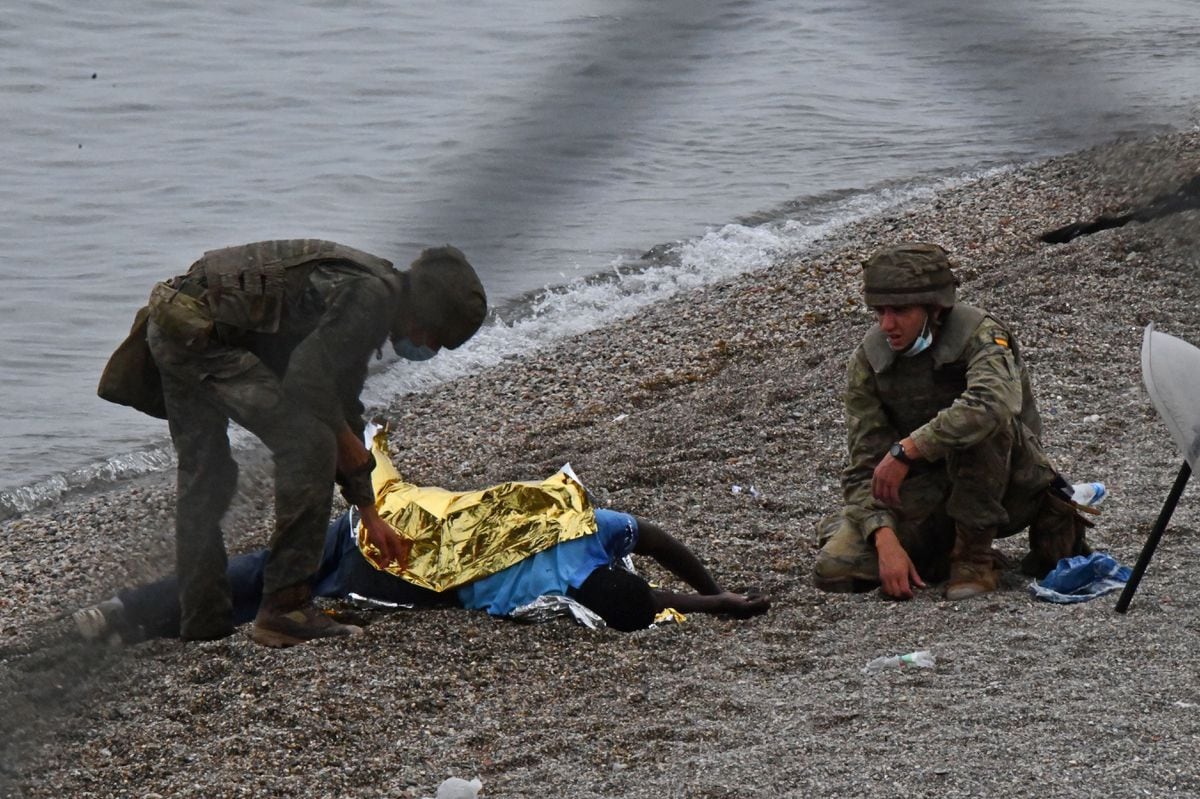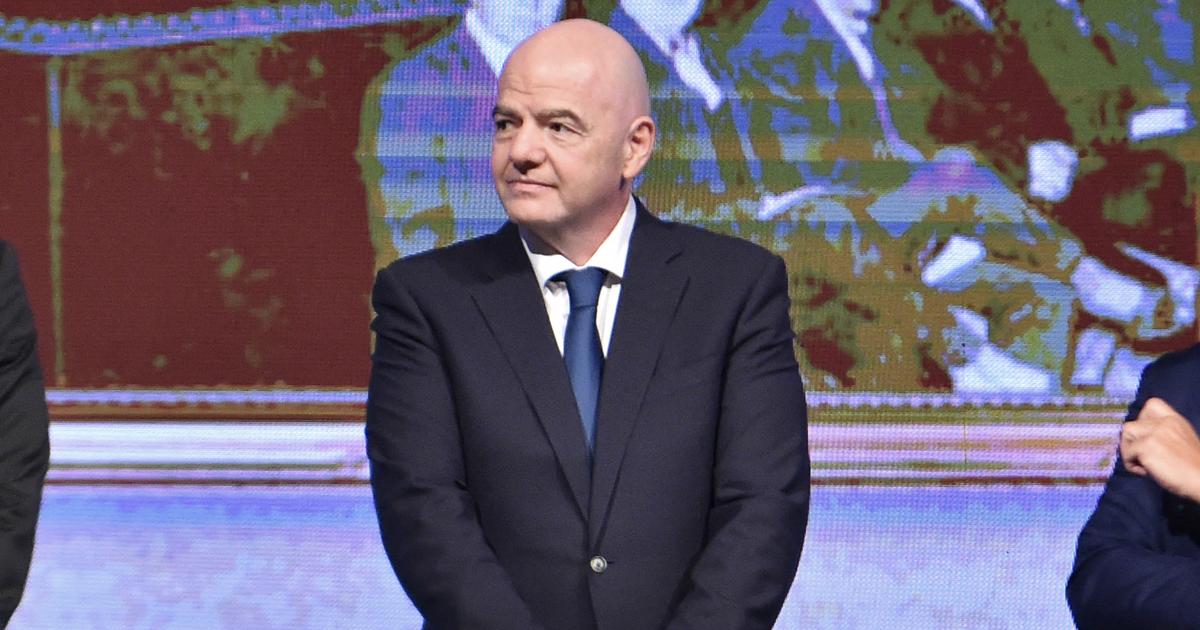The “humanitarian crisis” that broke out in Ceuta on Monday, with the arrival of thousands of immigrants swimming from the other side of the border with the complicity of the Moroccan gendarmes, emerged this Tuesday as a diplomatic crisis. The Foreign Minister, Arancha González Laya, summoned the Moroccan ambassador to Madrid, Karima Benyaich, to express her "rejection" and "disgust" for the Moroccan abandonment in its responsibility to control the border between the two countries; and Rabat called its ambassador in Madrid for consultations, which means leaving its diplomatic representation in Spain temporarily vacant. Until then, against all evidence, the Spanish Government had avoided blaming Morocco for the unprecedented flood of irregular immigrants in the autonomous city, which amounted to “about 8.000 ”at six in the afternoon this Tuesday, according to the Ministry of the Interior. By mid-afternoon, Morocco deployed riot control on its side of the border, substantially reducing the number of irregular entries.
In a statement on the steps of La Moncloa, without admitting questions and in a tone of utmost gravity, President Pedro Sánchez warned that “the territorial integrity of the borders of Ceuta and Melilla, which are also part of the EU, and the The safety of our compatriots will be defended by the Government of Spain at all times, under any circumstance and with all necessary means ”. After reiterating his will to maintain friendly relations with Morocco, he stressed that these should be based "always on respect for mutual borders." Sánchez did not speak of "invasion", as did the president of Ceuta, Juan Jesús Vivas, but he made it clear that he was not facing only a humanitarian or migratory problem, but a challenge to the security of Spain and its territorial integrity.
To demonstrate the government's firmness, it decided in the early hours of Tuesday to mobilize the Army garrison in Ceuta, with some 3,000 soldiers in total, who were suspended permits and reduced working hours. From early in the morning of this Tuesday legionaries of the Tercio Duque de Alba of the Legion could be seen in mixed patrols with national police and civil guards through the streets of the autonomous city and on the beach of Tarajal, regrouping the scattered immigrants and attending and organizing the newcomers to shore. In addition, the Minister of the Interior, Fernando Grande-Marlaska, announced the dispatch of 150 agents of the National Police and 50 of the Civil Guard to reinforce the 1,100 personnel of the State Security Forces and Bodies permanently deployed in the square. .
In reality, government sources acknowledge, neither the military nor the police can do much as long as Morocco does not prevent them from jumping into the water from the other side of the border, other than trying to prevent them from drowning, as happened with an immigrant last Monday. "You can't prevent your house from flooding if you don't turn off the tap upstairs," these sources graphically point out.
To reduce the water, Spain is applying bilateral agreements with Morocco to allow the return at the border of those who enter irregularly. By mid-afternoon, 4,000 people had already been returned - half of the arrivals in 36 hours, since Sunday night - and the Government hoped to be able to return the vast majority, who are Moroccan nationals. With the police reinforcements, it is intended that the immigration teams are operational 24 hours a day to speed up the return procedures. In theory, the exception is minors - it is estimated that they exceed 1,500 although there is no official estimate - whose repatriation is subject to a much more complex procedure in which the interest of the minor prevails.
Sánchez canceled the trip he planned to make this Tuesday to Paris to travel, accompanied by the Minister of the Interior, to Ceuta and Melilla, who had not stepped on a Prime Minister outside of the electoral campaign since 2006. In Ceuta, he was accused by several dozen of people leaving the helipad.
Meanwhile, a crisis cabinet headed by First Vice President Carmen Calvo met in La Moncloa.
Report to the King
Before leaving Madrid, Sánchez informed the King - who telephoned the president of Ceuta and also the president of Melilla, Eduardo de Castro, to inquire about the situation on the ground - and the leader of the PP, Pablo Casado. Sánchez also made a round of contacts with the highest officials of the EU to ensure their support in the fight with Morocco. Among others, he spoke with the President of the Council, Charles Michel, and the High Representative for EU Foreign Policy, Josep Borrell.
The cascade of statements of support for the Spanish position was immediate. Michel showed "all the support and solidarity with Spain" and recalled that "the borders of Spain are those of the European Union"; the president of the European Commission, Ursula von der Leyen, warned that the migration issue will be "crucial" in the future relationship of the EU with countries like Morocco; and Borrell stressed that "Ceuta is Spain's border with Morocco and the EU will do what is necessary to support Spain in these difficult times."
The Spanish officials avoided referring to the trigger for the current crisis: the decision to host the leader of the Polisario Front, Brahim Gali, to treat the coronavirus in a hospital in Logroño for "strictly humanitarian" reasons. It was the Moroccan ambassador in Madrid who, before going to her appointment with González Laya, assured that relations between neighbors are based on “mutual trust” and that there are acts that have consequences “and must be assumed”.
During the most critical hours of the crisis in Ceuta, the official Moroccan media have kept absolute silence on the dispute with Spain. Rabat's last allusion to this matter occurred on May 8, when its Ministry of Foreign Affairs issued a statement, the second on the matter, in which it warned Spain not to "minimize the serious impact" of this crisis on bilateral relations and warned him that he was taking note and would draw all the consequences of a "premeditated" decision, taken "behind the backs of a partner and neighbor", alluding to the decision to host Gali.
The opening of the border crossing with Ceuta would be the “consequence” of that decision, according to diplomatic sources, or perhaps just a warning, since the leader of the Polisario Front is still in Spain and is summoned to testify as a defendant before the court judge National Santiago Pedraz on June 1.







/cloudfront-eu-central-1.images.arcpublishing.com/prisa/GZBJJXO3EZE2HLSP5ZRRKYYYOY.JPG)






